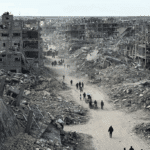Over the summer, as part of the Crossroads project, ASF is bringing you the latest news about international justice. Our teams on the ground give you the lowdown on progress, hold-ups, hopes and worries surrounding international justice and improving access to justice for victims. This week, Prashannata Wasti, who works for our partner INSEC, shares the latest news from Nepal. Find out how last April’s terrible earthquake is interfering with access to justice.
Q.: In May 2015, parts of Nepal were hit by a terrible earthquake. How does this natural disaster impact on progressing towards more access to justice and dealing with the crimes of the past?
A: Following the earthquake, the issue of international justice has suffered a setback. However, one ‘silver lining’ of the earthquake is that all the major political parties agreed to promulgate the new constitution by the end of July. At present, Nepal has an Interim Constitution drafted to gear the transformation process from a unitary, constitutional monarchy to a federal republic. A participatory process allowing human rights defenders to review and comment on the new draft constitution has been set up. We hope that once the new constitution is promulgated, politicians and human rights organizations will again focus their attention on the crucial issue of international justice in our country.

Q: How do you see the role of the international community at present on supporting international justice in Nepal?
A: We are very grateful to the international community for its support in responding to the emergency following the earthquake. Obviously, major aid agencies are focused on the reconstruction of the damaged infrastructures. The first objective is to normalize people’s daily lives. After such a dramatic event, which caused over 8,000 deaths, injured thousands and thousands others, and left so many people homeless, it’s completely understandable that issues like justice are not the main focus. However, we wish for a swift recovery for Nepal and hope that international justice will be back on the agenda soon.
Q: How is the earthquake affecting victims of human rights violations committed during the war, and access to justice?
A.: Some of the most war-torn districts, such as Gorkha, Kavre and Dhading have also been affected by the earthquake. So the victims of the conflict are also victims of the earthquake. It has been more than two months, but people are still in shock. All the attention goes to the earthquake, at every level. For example, human rights defenders are busy providing and monitoring the distribution of aid, ensuring it is being done following principles such as non-discrimination. We could say that even if human rights organizations keep raising the issue of access to justice, this might not be seen as a priority.
Q: Since World Human Rights Day (10 Dec. 2014) has any major progress been made in the area of international justice in Nepal?
A: Yes some progress has been made. A law adopted in 2014 (The Commission on Investigation of Disappeared Persons, Truth and Reconciliation Act) held the possibility to grant amnesty to perpetrators of international crimes and gross human rights violations. Victims and the population at large feared that perpetrators would be exempt from trial. More than 200 victims decided to file a petition to the Supreme Court of Nepal, thus challenging the discretionary powers of the two Commissions responsible for addressing the crimes of the past: the Truth and Reconciliation Commission and the Commission on Investigation of Disappeared Persons.
On 26 February 2015, the Supreme Court curtailed the discretionary powers of both Commissions to grant amnesty and said that the victim’s consent should be made mandatory for any act of reconciliation. This Court decision has been welcomed by victims and since February, the Nepalese government set up the framework for these two commissions and appointed commissioners.
Another positive development concerns Colonel Kumar Lama. Arrested in London in 2013, this high ranking officer of the Nepali Army is charged with two counts of torture during the civil war in 2005. His trail started in early 2015 in the United Kingdom.
The Crossroads project: convinced that trying crimes of the past can help build a better future, ASF and its partners, ASF Canada and INSEC, support access to international criminal justice for the most vulnerable people whilst respecting the rule of law and international standards. The project involves six countries on three continents, with the specific aim of strengthening justice systems in the six countries in question. Discover the stories of those involved in international justice in Burundi, Colombia, Democratic Republic of Congo, Guatemala, Nepal and Uganda. Read and watch their testimonies www.roadtojustice.eu.
Cover picture: Nepal © 2014 Universal TV Media



